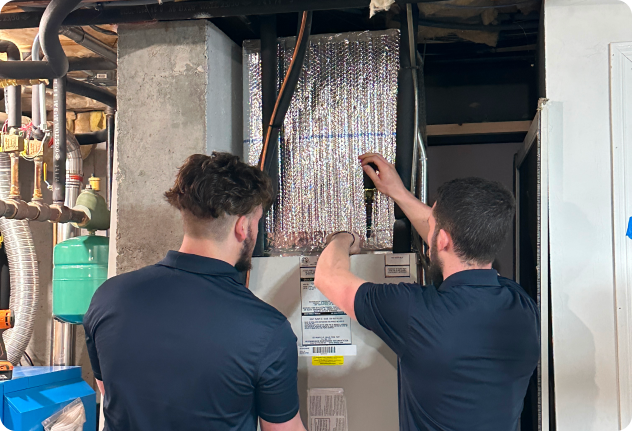Indoor Air Quality
Indoor Air Quality Testing in Massachusetts
$100 Off IWave Indoor Air Quality
iWave On Indoor Air Quality
***Great For Back to School***

Why Indoor Air Quality (IAQ) Matters in Massachusetts
Massachusetts, with its distinct seasons and diverse climate, presents unique challenges when it comes to maintaining healthy indoor air. Whether you’re braving the cold, dry winters or the warm, humid summers, the quality of the air inside your home can significantly impact your health and comfort. Indoor Air Quality (IAQ) testing is a crucial step in ensuring that your living environment is safe, particularly in a state like Massachusetts where weather and building age can exacerbate air quality issues.
Poor indoor air quality has been linked to a range of health problems, from allergies and asthma to more serious respiratory conditions. Testing your indoor air regularly is not just a proactive measure for your health; it’s also essential for maintaining the overall comfort and safety of your home.

Common Indoor Air Quality Issues in Massachusetts Homes
Massachusetts homeowners often face several IAQ challenges that can vary with the season and the type of building. Here are some of the most common issues:
- Mold and Mildew: Due to the high humidity in the summer and poor ventilation in older buildings, mold and mildew can thrive, particularly in basements and bathrooms.
- Radon: Massachusetts is known for its older homes, many of which are at higher risk for radon—a naturally occurring radioactive gas that can accumulate indoors and is a leading cause of lung cancer in non-smokers.
- Volatile Organic Compounds (VOCs): These harmful chemicals can be found in household products like paints, cleaning supplies, and even new furniture. They contribute to indoor air pollution and can cause a variety of health problems.
- Allergens: Dust mites, pet dander, and pollen are common in Massachusetts homes, particularly during spring and fall, exacerbating allergies and asthma.

State and Local Regulations in Massachusetts
What’s Involved in an IAQ Test?
Professional IAQ testing uses advanced equipment to accurately detect and measure these pollutants, offering far more reliable results than DIY kits.
An Indoor Air Quality test in Massachusetts typically involves a comprehensive assessment of your home’s air, checking for a variety of pollutants:
- Carbon Monoxide: A deadly, odorless gas that can come from improperly vented heating equipment.
- Radon: Testing for radon is crucial, especially in areas known for high levels of this gas.
- Mold Spores: Air samples are taken to determine the presence and concentration of mold spores.
- Volatile Organic Compounds (VOCs): The test will measure the levels of VOCs in your indoor air, providing a clear picture of chemical exposure.
Read our 5-star reviews on Google.

Benefits of Regular Indoor Air Quality Testing
Regular IAQ testing offers numerous benefits, including:
- Health Protection: Reduces exposure to harmful pollutants and allergens, helping to prevent respiratory issues and chronic conditions like asthma.
- Peace of Mind: Knowing that the air you’re breathing is safe allows you to rest easy, particularly if you have vulnerable family members such as young children or the elderly.
- Increased Home Value: Homes with verified good indoor air quality can be more attractive to potential buyers, especially those concerned about health and wellness.
- Energy Efficiency: Proper air quality can lead to a more efficient HVAC system, as it won’t have to work as hard to filter out pollutants, ultimately saving you money on energy bills.
State and Local Regulations in Massachusetts
Massachusetts has specific regulations regarding indoor air quality, especially when it comes to radon testing. The state encourages regular radon testing in homes, particularly in areas with higher radon levels. There are also local incentives and programs that can help homeowners address air quality issues, making it easier and more affordable to improve the air you breathe.


Choosing A Professional IAQ Testing Service In Massachusetts
When selecting an Indoor Air Quality testing service, it’s essential to choose a provider familiar with the unique challenges of Massachusetts homes. Here’s what to look for:
- Certifications: Ensure the service is certified by reputable organizations such as NADCA (National Air Duct Cleaners Association) or ASHRAE (American Society of Heating, Refrigerating and Air-Conditioning Engineers).
- Local Expertise: Choose a company that understands the specific IAQ issues common in Massachusetts, from the effects of harsh winters to the challenges of older home infrastructure.
- Comprehensive Services: The best IAQ testing services will offer a thorough assessment and clear, actionable advice on how to address any issues found during the test.
Prioritize Your Health and Comfort
Your health and comfort depend on the air you breathe every day. Regular Indoor Air Quality testing is a simple but crucial step in maintaining a safe and healthy home environment in Massachusetts. Don’t wait until poor air quality affects your health—take action today and ensure your home’s air is clean, safe, and comfortable.
Contact us now to schedule your professional IAQ test and breathe easier knowing your home is a safe haven for you and your family.
Contact Us!
Emergency Service, Same Day or Next Day service for AC, Heating, Water Heaters, Duct Sealing Services